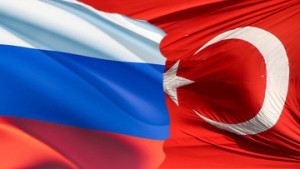
The protocol of the 12th meeting of the Mixed Russian–Turkish Intergovernmental Commission for Trade and Economic Cooperation stated that the creation of favourable conditions for mutual trade in order to achieve a 100-billion trade turnover (according to the Turkish statistics, in 2012, trade turnover was more than 33 billion dollars) has become the main area of interaction between the two countries. The parties signed a bilateral programme for trade and economic cooperation for the years 2012–2015.
The document is indicative in nature and a kind of industry “road map” defining the joint strategy for partnership in such areas as energy, industry, agriculture, tourism, regional cooperation, transport, financial and banking cooperation. The programme is designed to further facilitate the creation of favourable conditions for the realisation of the business potential of Moscow and Ankara.
In spite of the adoption of this document and the agreements reached following the meeting of the intergovernmental commission, the three-fold increase in the current volume of annual trade turnover planned by the authorities of the two countries is unlikely to be achieved within 3 years’ time. This will require at least another 5–7 years.
The extent of Russia’s interest in the Turkish market is limited to large-scale projects, the dividends from which can be obtained in the long term. But a situation may arise in which Moscow will not receive the expected returns at all. This is because Ankara is quite capable of switching from one project to another guided by its own geopolitical and economic interests.
Suffice it to recall the story of the Nabucco gas pipeline, which was nothing else but the vis-à-vis of South Stream. It was in Russia’s interests to develop the latter pipeline, whilst the former one was important for Europe and the US, which have been trying for a long time to weaken the power of the Russian “energy muscles”. Initially, Turkey, which supported the West, was actively lobbying for the promotion of Nabucco, and that caused serious concern in Moscow. However, later on, on realising the extremely low profitability of this project, which used to be one of the most popular projects of recent years, Turkey sided with Russia and joined the other project. An agreement was signed in Moscow allowing the laying of South Stream through Turkey’s exclusive economic zone in the Black Sea.
In response to that, Russia reduced prices for the natural gas which Turkey buys as part of take-or-pay contracts. In 2013, Ankara will purchase an additional 3 billion cubic metres of unclaimed raw gas from the already existing gas pipeline. The parties expressed willingness to develop cooperation on the export of gas and to discuss issues on increasing gas supplies from Russia to Turkey through Blue Stream or the Trans-Balkan pipeline.
Under the contract with Russia, the Turkish side undertakes either to purchase the specified amount of “blue fuel” by a certain date or to pay the cost of this gas, even if it does not need it by this date. Initially, the Turks were happy with these terms, but, with the expansion of other sources of gas supply as well as with the decrease in its demand within the country, this kind of transactions became unprofitable for Ankara.
Thus, by concluding the above-mentioned agreement on the South Stream gas pipeline, Turkey, first of all, has cared about its own interests. On the one hand, it has improved its prospects of becoming an important transit hub for Europe and Asia, and, on the other hand, it has been able to ensure more favourable terms for paying its arrears on natural gas.
It is getting clear that the development of bilateral relations in the energy sphere will be built based on the strategic plans of the states during a specific period of time. Here, you cannot really count on the agreements that have been reached earlier because, as has been shown in practice, they may well be adjusted in accordance with the agenda. The situation around South Stream and Nabucco is graphic evidence of that.
Eldar Kasayev, an expert on energy investments in the Middle East and North Africa, exclusively for the online magazine “New Eastern Outlook”.